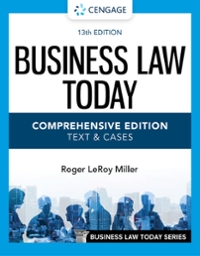Robert Durbin, a student, borrowed funds from a bank for his education and signed a promissory note
Question:
Robert Durbin, a student, borrowed funds from a bank for his education and signed a promissory note for their repayment. The bank loaned the funds under a federal program designed to assist students at postsecondary institutions. Under this program, repayment ordinarily begins nine to twelve months after the student borrower fails to carry at least one-half of the normal full-time course load. The federal government guarantees that the note will be fully paid. If the student defaults on the payments, the lender presents the current balance—principal, interest, and costs—to the government. When the government pays the balance, it becomes the lender, and the borrower owes the government directly.
After Durbin defaulted on his note, the government paid the lender the balance due and took possession of the note. Durbin then refused to pay the government, claiming that the government was not the holder of the note. The government filed a suit in a federal district court against Durbin to collect the amount due. Using the information presented in the chapter, answer the following questions.
1. Was the note that Durbin signed an order to pay or a promise to pay? Explain.
2. Suppose that the note did not state a specific interest rate but instead referred to a statute that established the maximum interest rate for government-guaranteed student loans. Would the note fail to meet the requirements for negotiability in that situation? Why or why not?
3. How does a party who is not named in a negotiable instrument (in this situation, the government)
obtain a right to enforce the instrument?
4. Now suppose that the school Durbin attended closed down before he could finish his education.
In court, Durbin argues that this resulted in a failure of consideration: he did not get something of value in exchange for his promise to pay. Assuming that the government is a holder of the promissory note, will this argument likely be successful against it? Why or why not?
Step by Step Answer:






